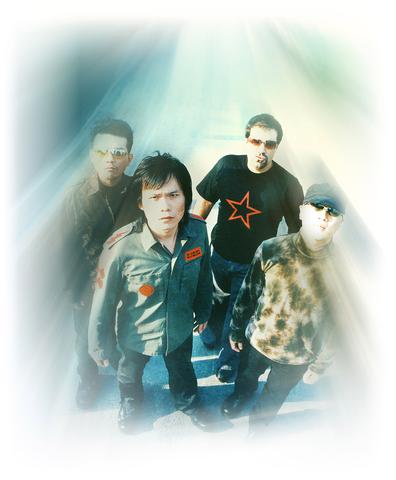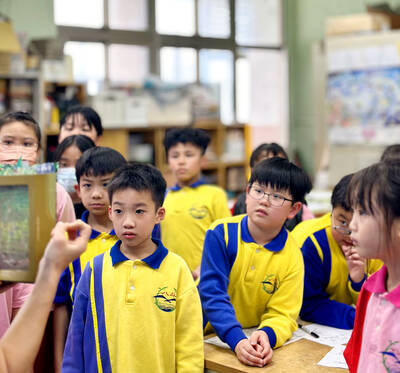Dubbed "the king of live music" by both the Asian music press and a multitude of fans scattered across the region, homegrown guitar hero, Wu Bai (伍佰), and his band, China Blue will be bringing their 2002 Ninth Heaven Tour to fans across Taiwan over the coming month.
The tour, which is the combo's first such large-scale venture in Taiwan for nearly two years, comes hot on the heels of the band's recent sell-out Pub High sojourn around the nation.
While the mini-tour saw Wu Bai and his hard-playing band -- bassist Ju Jian-hui (

PHOTO: MAGIC STONE RECORDS
Beginning at Taipei Municipal Stadium (
Since hitting the local music scene in the early 1990s with its self-titled debut album, Wu Bai and China Blue have appeared on top music charts across Asia with a string of hit albums. The most recent of which, Dream River (夢的河流), although released late last year, is still riding high on pop charts in Singapore, Malaysia, Hong Kong and China.
While the Asian music scene is hardly short of heroes, the meteoric way in which the local rocker and his combo made the big time differs radically from many of their peers.
The phenomena that has become Wu Bai and China Blue was not created by record company executives with an eye on a quick profit. In fact, with the exception of popular indie rockers, Quarter Back (
"We all played for different bands up until about 1991, after which [Ju Jian-hui] and I began jamming together with the eventual idea of forming a newer, fresher, and original rock band," Zavolta said. "Then one day, he called me up and asked me if I would mind filling in for a one-off gig with himself and a guitarist named Wu Bai."
According to Zavolta, the trio hit it off almost immediately and China Blue fell into place shortly thereafter.
"Something just clicked between us. Both the music and the mo chi (
By the mid-1990s, the band had conquered the hearts and minds of a Taiwanese audience sorely lacking guitar heroes. With its eclectic brand of very Taiwanese rock `n' roll enjoying an all-time high the length and breadth of the nation, the combo branched out and began replicating this success across Asia. The band's high-octane gigs in China, Hong Kong and Singapore are now guaranteed sellouts.
A major factor of the popularity of the bands' live performances is the ability of the four-piece combo to continue to create original and exciting material. Material that not only has the capability to appease fans with a hunger for guitar-laden rock, but also charm fans with an ear for less raucous vibes.
"Although our styles may vary, our sound remains the same. Our most recent album is a good example of this. [The album] is extremely versatile. If you are a rocker, Broken (
Although the back-clad, helmet hair-styled Wu Bai has become one of Asia's most instantly recognizable rock icons and has would-be rockers emulating his low-slung guitar playing stance from Beijing to Bangkok, China Blue is far more than a backing band. Wu Bai is as much a part of China Blue as are China Blue a part of Wu Bai.
"Wubai is part of China Blue. He is the lead singer and guitarist of China Blue. Just as Hsiao Ju is the bassist, [Yu Dai-ho] the keyboard player and I'm the drummer," Zavolta said. "Although he writes the music and lyrics, we arrange each song as a band. Wu Bai makes a rough version of a song he has written and then we collectively arrange it together. Which is the crux of our contrasting styles."

May 26 to June 1 When the Qing Dynasty first took control over many parts of Taiwan in 1684, it roughly continued the Kingdom of Tungning’s administrative borders (see below), setting up one prefecture and three counties. The actual area of control covered today’s Chiayi, Tainan and Kaohsiung. The administrative center was in Taiwan Prefecture, in today’s Tainan. But as Han settlement expanded and due to rebellions and other international incidents, the administrative units became more complex. By the time Taiwan became a province of the Qing in 1887, there were three prefectures, eleven counties, three subprefectures and one directly-administered prefecture, with

It’s an enormous dome of colorful glass, something between the Sistine Chapel and a Marc Chagall fresco. And yet, it’s just a subway station. Formosa Boulevard is the heart of Kaohsiung’s mass transit system. In metro terms, it’s modest: the only transfer station in a network with just two lines. But it’s a landmark nonetheless: a civic space that serves as much more than a point of transit. On a hot Sunday, the corridors and vast halls are filled with a market selling everything from second-hand clothes to toys and house decorations. It’s just one of the many events the station hosts,

Two moves show Taichung Mayor Lu Shiow-yen (盧秀燕) is gunning for Chinese Nationalist Party (KMT) party chair and the 2028 presidential election. Technically, these are not yet “officially” official, but by the rules of Taiwan politics, she is now on the dance floor. Earlier this month Lu confirmed in an interview in Japan’s Nikkei that she was considering running for KMT chair. This is not new news, but according to reports from her camp she previously was still considering the case for and against running. By choosing a respected, international news outlet, she declared it to the world. While the outside world

Through art and storytelling, La Benida Hui empowers children to become environmental heroes, using everything from SpongeBob to microorganisms to reimagine their relationship with nature. “I tell the students that they have superpowers. It needs to be emphasized that their choices can make a difference,” says Hui, an environmental artist and education specialist. For her second year as Badou Elementary’s artist in residence, Hui leads creative lessons on environmental protection, where students reflect on their relationship with nature and transform beach waste into artworks. Standing in lush green hills overlooking the ocean with land extending into the intertidal zone, the school in Keelung